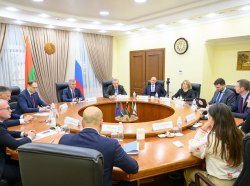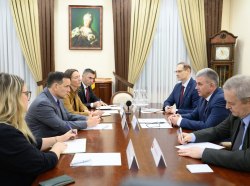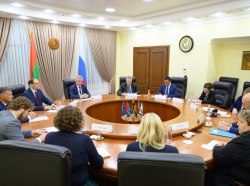Speculation about the possibility of breaking the current format of a peacekeeping operation in Pridnestrovie, in which Russia plays a key role, and withdrawing Russian troops from the PMR is out of touch with reality and completely ignores the views of Pridnestrovians, the deputy foreign minister, Grigory Karasin, said in an interview with Kommersant Daily.
According to him, both Russia and many other responsible UN members treat the statements by the current MoloмЬMn government about the withdrawal of the Operational Group of Russian Forces (OGRF) with great scepticism, viewing it as a threat to the emergence of a new source of tension in south-eastern Europe.
"Are the existing hotbeds of confrontation insufficient for us?" asks Karasin.
He reiterated that any attempt by one of the parties to retreat from its responsibility to comply the Agreement on the Principles of Peaceful Settlement of the Moldo-Pridnestrovian Conflict of 1992 "revives the threat of a reversal of the conflict to a hot phase, especially amid current 'stalled' dialogue between Kishinev and Tiraspol."
The presence of Russian soldiers in Pridnestrovie, he says, is stipulated in a protocol on the quantitative composition and deployment of peacekeepers, adopted as part of the agreement of 28 July 1992. In the meantime, according to the diplomat, this quota is not filled.
"Those who promote the withdrawal of the Russian military have a poor memory for history. It is the Russian military that stopped the bloodshed in 1992," said Karasin, adding that "the presence of the Russian military on the Dniester continues to give local residence confidence that tomorrow will be peaceful and calm."
According to the poll conducted by Pridnestrovian State University in 2016 in all Pridnestrovian districts, 82.7% of the respondents considered the withdrawal of Russian troops from Pridnestrovie to be unacceptable, and 58.5% of them believed that the foreign political situation was alarming and troubling.
For 25 years the Russian military contingent has remained the guarantor of stability in the region, the diplomat noted, and this is especially important amid continuing provocations by the proponents of blockade and coercive approaches to resolving the Moldo-Pridnestrovian conflict.
"The unique peacekeeping operation on the Dniester has been proving its efficiency for 25 years. Nobody shoots and dies there. Changing its format into a UN-led one will not lead to anything but a dangerous escalation," Karasin believes.
He insists, in the meantime, on "the subject of the Moldo-Pridnestrovian settlement being prevented from becoming another object of geopolitical games, fraught with the most unpredictable consequences."








